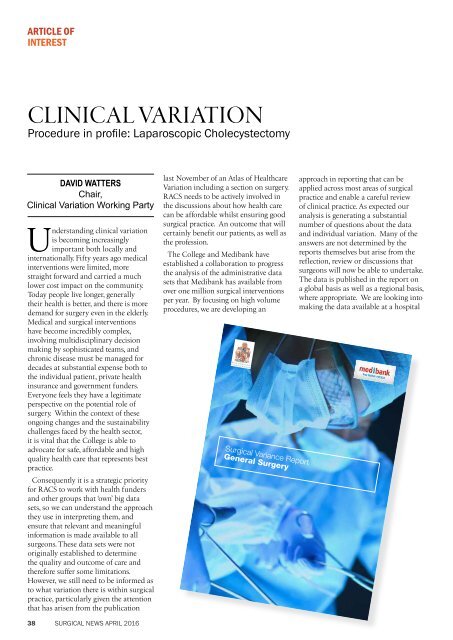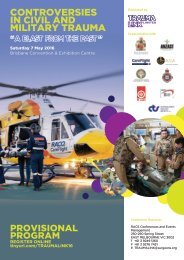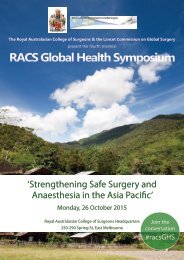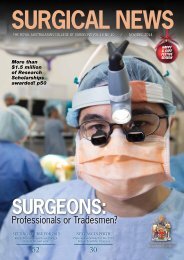Create successful ePaper yourself
Turn your PDF publications into a flip-book with our unique Google optimized e-Paper software.
ARTICLE OF<br />
INTEREST<br />
ARTICLE OF<br />
INTEREST<br />
CLINICAL VARIATION<br />
Procedure in profile: Laparoscopic Cholecystectomy<br />
DAVID WATTERS<br />
Chair,<br />
Clinical Variation Working Party<br />
Understanding clinical variation<br />
is becoming increasingly<br />
important both locally and<br />
internationally. Fifty years ago medical<br />
interventions were limited, more<br />
straight forward and carried a much<br />
lower cost impact on the community.<br />
Today people live longer, generally<br />
their health is better, and there is more<br />
demand for surgery even in the elderly.<br />
Medical and surgical interventions<br />
have become incredibly complex,<br />
involving multidisciplinary decision<br />
making by sophisticated teams, and<br />
chronic disease must be managed for<br />
decades at substantial expense both to<br />
the individual patient, private health<br />
insurance and government funders.<br />
Everyone feels they have a legitimate<br />
perspective on the potential role of<br />
surgery. Within the context of these<br />
ongoing changes and the sustainability<br />
challenges faced by the health sector,<br />
it is vital that the College is able to<br />
advocate for safe, affordable and high<br />
quality health care that represents best<br />
practice.<br />
Consequently it is a strategic priority<br />
for RACS to work with health funders<br />
and other groups that ‘own’ big data<br />
sets, so we can understand the approach<br />
they use in interpreting them, and<br />
ensure that relevant and meaningful<br />
information is made available to all<br />
surgeons. These data sets were not<br />
originally established to determine<br />
the quality and outcome of care and<br />
therefore suffer some limitations.<br />
However, we still need to be informed as<br />
to what variation there is within surgical<br />
practice, particularly given the attention<br />
that has arisen from the publication<br />
last November of an Atlas of Healthcare<br />
Variation including a section on surgery.<br />
RACS needs to be actively involved in<br />
the discussions about how health care<br />
can be affordable whilst ensuring good<br />
surgical practice. An outcome that will<br />
certainly benefit our patients, as well as<br />
the profession.<br />
The College and Medibank have<br />
established a collaboration to progress<br />
the analysis of the administrative data<br />
sets that Medibank has available from<br />
over one million surgical interventions<br />
per year. By focusing on high volume<br />
procedures, we are developing an<br />
Surgical Variance Report<br />
General Surgery<br />
approach in reporting that can be<br />
applied across most areas of surgical<br />
practice and enable a careful review<br />
of clinical practice. As expected our<br />
analysis is generating a substantial<br />
number of questions about the data<br />
and individual variation. Many of the<br />
answers are not determined by the<br />
reports themselves but arise from the<br />
reflection, review or discussions that<br />
surgeons will now be able to undertake.<br />
The data is published in the report on<br />
a global basis as well as a regional basis,<br />
where appropriate. We are looking into<br />
making the data available at a hospital<br />
level without identifying any<br />
individual surgeon.<br />
RACS and Medibank are<br />
currently exploring a way<br />
to provide information to<br />
individual surgeons as to<br />
where they are within the<br />
global data-set. This process<br />
will take several months to<br />
develop and will be via a<br />
direct enquiry between the<br />
surgeon and Medibank with<br />
consent being given for the<br />
data to be extracted.<br />
The College will never<br />
have individual surgeon<br />
performance data made<br />
available to it.<br />
The role of the College<br />
is to ensure a meaningful<br />
approach is established<br />
and that education can be<br />
provided across the entire<br />
Fellowship as to what<br />
variation exists. We are very<br />
fortunate that Medibank<br />
has engaged so productively<br />
with the College in this<br />
endeavour. We are hopeful<br />
of progressively replicating<br />
this process with other<br />
funders and their data sets.<br />
We are presenting these<br />
initial reports through<br />
Surgical News as the<br />
first part of a broader<br />
communication strategy.<br />
The procedure within this<br />
report is Laparoscopic<br />
cholecystectomy. In 2014<br />
Medibank funded 4675<br />
procedures where it was<br />
recorded as the principal<br />
procedure (highest value<br />
MBS fee in the medical<br />
claim). The most significant<br />
number was Laparoscopic<br />
Cholecystectomy with MBS<br />
code 30445 (97%) with<br />
laparoscopic exploration of<br />
the common bile duct,30448<br />
(3%). During the one year<br />
time period 682 surgeons<br />
billed Medibank with 330<br />
(48%) of these surgeons<br />
Figure 1: The Median age of the patients was 54 years<br />
Figure 2: The Median patient length of stay in hospital<br />
Figure 3: Percentage of separations where patient was transferred to<br />
ICU or another hospital<br />
38 <strong>SURGICAL</strong> <strong>NEWS</strong> APRIL 2016 <strong>SURGICAL</strong> <strong>NEWS</strong> APRIL 2016 39






